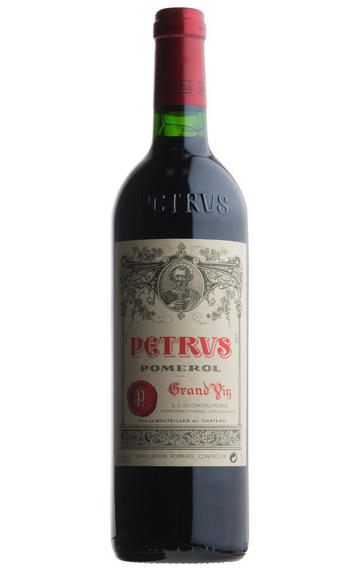
2019 Petrus, Pomerol, Bordeaux
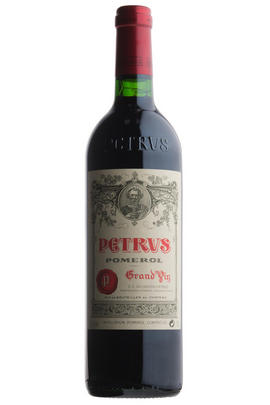
Critics reviews
Tasted blind at the Southwold annual tasting.
The 2019 Pétrus is relatively flamboyant on the nose with gregarious black cherries and raspberry coulis scents mixed with autumn bonfire and fireside hearth. The palate is medium-bodied with fine-grain tannins, well-balanced, and quite fresh with a poised and delineated finish. I adore the pepperiness that lingers in the mouth, a multifaceted Pomerol with a long life ahead.
Drink 2027 - 2060
Neal Martin, Vinous.com (February 2023)
Olivier Berrouet turned out a fabulous Petrus in 2019. A gorgeous, expansive wine, the 2019 opens beautifully over time. There is a feeling of radiance in the 2019 that is impossible to miss. Hints of rose petal, lavender, mint and cinnamon meld effortlessly into a core of red/purplish fruit. At 14.8%, the alcohol is high, but not intrusive. "We worked very hard to extract as gently as possible," Berrouet explained. Readers lucky enough to own the 2019 should plan on cellaring it for a decade or more.
Drink 2029 - 2069
Antonio Galloni, Vinous.com (February 2022)
50% new oak
A dense, structured Petrus that is full of naturally fleshy but concentrated blueberry, blackberry, cassis and loganberry fruits that feel both fully ripe and fully subdued and closed in on themselves right now. As ever with Petrus, you have to be patient, as everything just slows down and takes its time. The tannins are juicy, with great aromatic persistency, allowing touches of smoked caramel, black truffle, black chocolate and pencil lead through as it opens. As it uncurls things turn spicier and more profound, with edges of mint leaf, fennel, aniseed and eucalyptus. This is a wine with so much to say, and it is in no hurry to go anywhere.
Drink 2029 - 2050
Jane Anson, Decanter.com (November 2021)
100% Merlot. Barrel sample.
Massive wine in terms of structure and density of fruit but the aromatic freshness pulls it all into line. Fragrant, almost upfront, red-berry aromas. Burgundian nuance again. Sweet Merlot character but not overdone and certainly no thickness to the wine. With smooth, caressing texture, the tannic mass is refined and almost hidden although the power can be sensed behind. A fresh chalky edge complements the fruit and adds to the persistence providing a harmonious whole. Needs time to unfurl.
Drink 2030 - 2055
James Lawther MW, JancisRobinson.com (June 2020)
The 2019 Pétrus is a powerful, heady wine, bursting from the glass with aromas of raspberries, cassis, violets, spices, licorice and kirsch. Full-bodied, fleshy and layered, with an ample core of fruit, lively acids and powdery tannins that assert themselves on the liqueured finish, it's a ripe, high-octane Petrus that reflects the influence of a dry, warm growing season on what is essentially a single cépage (Merlot) and a single soil type (clay).
Winemaker Olivier Berrouet, following in his father's footsteps, continues to pursue a very classical, elegant style at Pétrus, a site naturally inclined to produce Pomerol's most muscular wine. He considers timing the date of harvest to be of the essence in avoiding excess; extraction is gentle, with daily pump-overs performed by hand during two or at most three weeks of maceration; and the modest 50% of new oak barrels employed at this address (from Taransaud, Darnajou, Séguin Moreau and Demptos) are steamed and then soaked with water for 15 days before filling to minimize their impact.
So, I suspect that the 2019 vintage's power and structure arrived against his best intentions. Certainly, with essentially only one cépage (Merlot) and one soil type (blue clay) and a surface area of only just over 11 hectares, Berrouet doesn't have many options when a warm, dry vintage comes along. Power, rather than opulence, is the order of the day chez Pétrus this year, and while the 2019 is a prodigious wine, it will require notable patience of anyone wishing to see it at full maturity.
Drink 2029 - 2059
William Kelley, Wine Advocate (April 2022)
A seductive and sensual nose full of ripe and sweetly perfumed cherry and blackcurrant notes - which are even more expressive and abundant after an hour in the glass. This is such a beguiling wine, changing in texture and fruit profile several times from a first sip of smooth and streamlined, chalky tannins to one filled with bright acidity and succulent juiciness then shifting another gear delivering a palate full of concentrated dark fruits edged with liquorice and black pepper.
The tannins are abundant and clearly present, Olivier Berrout director of Petrus says he’s never produced a vintage with such high tannins, but they are wonderfully consistent and well integrated with a lovely powdery element to them. You really feel the structure develop in the mouth, building in complexity and layers with a beautiful perfume and wet stone minerality lingering on the long finish. You have to wait for the reticence and reservation of Petrus in its youth to subside before you see the power and energy here but it’s giving a tantalising glimpse of what its long life holds in store.
Drink 2030 - 2055
Georgina Hindle, Decanter.com (January 2022)
The 2019 Château Pétrus is a behemoth, and I can't imagine a better marriage of sexy, opulent fruit with purity, precision, and length. Always all Merlot from a single parcel of clay soils, it takes time to unwind in the glass (I followed this bottle for multiple days) and offers a powerful, primordial style in its black cherries, mulberries, smoked tobacco, damp earth, and chocolate, as well as a beautiful floral component that emerges with air.
Dense, concentrated, and incredibly rich on the palate, it has a multi-dimensional mouthfeel and sweet yet substantial tannins. Despite plenty of glycerin and opulence on the palate, which certainly makes it fun to taste today, it has a very straight, classic feel that will demand bottle age. It probably needs to be forgotten for 8-10 years and will deliver the goods over the following 50 years or more.
Drink 2030 - 2082
Jeb Dunnuck, JebDunnuck.com (November 2022)
About this WINE
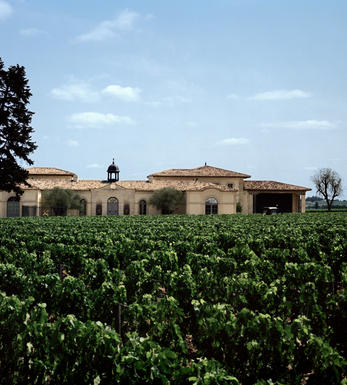
Petrus
Petrus is a wine estate in Pomerol on the Right Bank of Bordeaux. It is among the most celebrated and recognisable wines in the world.
While the estate can trace its history to at least 1837, it flew relatively under the radar until around the 20th century. Madame Loubat, who became the sole owner in 1945, felt that the estate was truly special, and her efforts were instrumental in establishing Petrus on the world stage. She also appointed Jean-Pierre Moueix as the exclusive agent; he and his sons Jean-François and Christian were key in building the estate’s modern reputation. The Moueix family became majority owners here in 1969. In 2018, they were joined by American-Colombian Alejandro Santo Domingo, who purchased a 20% stake.
Petrus is located atop the Pomerol plateau. Most of its vines sit on a so-called “buttonhole” of blue clay soil, known as smectite. This soil’s ability to retain water is a huge benefit in the Pomerol appellation, where drought is a known issue. The vineyard is planted mostly to Merlot.
The estate is run today by winemaker Olivier Berrouet, previously of neighbouring Château Cheval Blanc. Olivier joined in 2008, taking over from his father, Jean-Claude, who had produced 44 vintages of Petrus in his time.
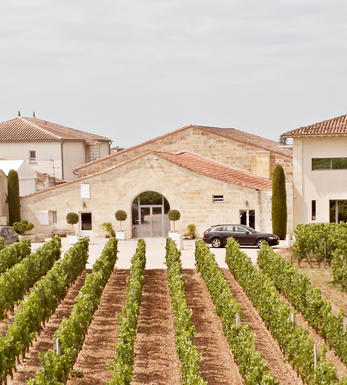
Pomerol
Pomerol is the smallest of Bordeaux's major appellations, with about 150 producers and approximately 740 hectares of vineyards. It is home to many bijou domaines, many of which produce little more than 1,000 cases per annum.
Both the topography and architecture of the region is unremarkable, but the style of the wines is most individual. The finest vineyards are planted on a seam of rich clay which extends across the gently-elevated plateau of Pomerol, which runs from the north-eastern boundary of St Emilion. On the sides of the plateau, the soil becomes sandier and the wines lighter.
There is one satellite region to the immediate north, Lalande-de-Pomerol whose wines are stylistically very similar, if sometimes lacking the finesse of its neighbour. There has never been a classification of Pomerol wines.
Recommended Châteaux : Ch. Pétrus, Vieux Ch. Certan, Le Pin, Ch. L’Eglise-Clinet, Ch. La Conseillante, Ch. L’Evangile, Ch. Lafleur, Trotanoy, Ch. Nenin, Ch. Beauregard, Ch. Feytit-Clinet, Le Gay.
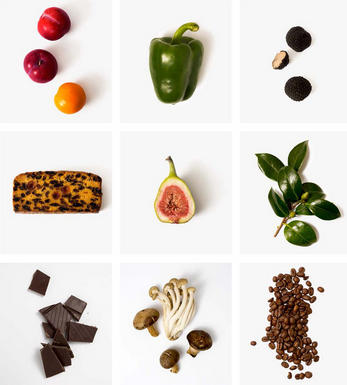
Merlot
The most widely planted grape in Bordeaux and a grape that has been on a relentless expansion drive throughout the world in the last decade. Merlot is adaptable to most soils and is relatively simple to cultivate. It is a vigorous naturally high yielding grape that requires savage pruning - over-cropped Merlot-based wines are dilute and bland. It is also vital to pick at optimum ripeness as Merlot can quickly lose its varietal characteristics if harvested overripe.
In St.Emilion and Pomerol it withstands the moist clay rich soils far better than Cabernet grapes, and at it best produces opulently rich, plummy clarets with succulent fruitcake-like nuances. Le Pin, Pétrus and Clinet are examples of hedonistically rich Merlot wines at their very best. It also plays a key supporting role in filling out the middle palate of the Cabernet-dominated wines of the Médoc and Graves.
Merlot is now grown in virtually all wine growing countries and is particularly successful in California, Chile and Northern Italy.


Buying options
Add to wishlist
Description
Tasted blind at the Southwold annual tasting.
The 2019 Pétrus is relatively flamboyant on the nose with gregarious black cherries and raspberry coulis scents mixed with autumn bonfire and fireside hearth. The palate is medium-bodied with fine-grain tannins, well-balanced, and quite fresh with a poised and delineated finish. I adore the pepperiness that lingers in the mouth, a multifaceted Pomerol with a long life ahead.
Drink 2027 - 2060
Neal Martin, Vinous.com (February 2023)
wine at a glance
Delivery and quality guarantee